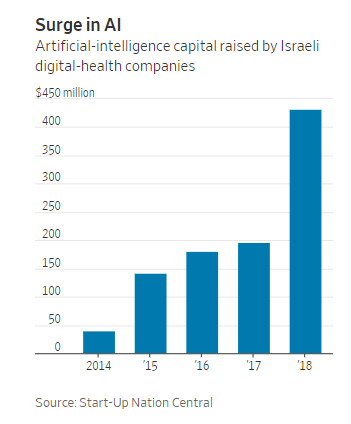Israel plans to combine HMOs’ digital health records that cover most Israelis into a single system for AI and data analytics to tap.
The Wall Street Journal
By Dov Lieber
Sept. 15, 2019
PHOTO: PEP MONTSERRAT
Israel is becoming a testing ground for the power of artificial intelligence to improve health care.
Digital medical records for the vast majority of Israelis are currently stored in databases maintained by the handful of semipublic HMOs that provide most health care in Israel.
While the biggest health-maintenance organizations already leverage their records in partnerships with private companies to develop technology for more advanced health care, Israel’s government wants to take such efforts to a new level.
Israel is becoming a testing ground for the power of artificial intelligence to improve health care.
The government last year announced a $264 million initiative to begin to combine those millions of records into a giant unified system, one that takes decades of individual patients’ information and puts it all in the same format so medical data looks the same across all health-care institutions.
Corralling the records and organizing them in ways that maximize their usefulness to AI programs and data analytics, the government hopes, will make the data of even greater value to researchers and health-care companies.
And the greater goals, officials say, based largely on the promise of AI technology, are to make health care less expensive, more effective and better tailored to individuals everywhere.
The government last year announced a $264 million initiative to begin to combine those millions of records into a giant unified system, one that takes decades of individual patients’ information and puts it all in the same format so medical data looks the same across all health-care institutions.
And the greater goals, officials say, based largely on the promise of AI technology, are to make health care less expensive, more effective and better tailored to individuals everywhere.
AI-assisted machines and programs, with their ability to learn and draw conclusions from the millions of detailed histories, medical tests and diagnostic results stored in these records, have the potential to
- help doctors give more preventive care by spotting diseases in earlier stages;
- tailor more medicine to the needs of specific patients;
- read diagnostic imagery and lab tests faster and more accurately;
- and make health-care less expensive.
AI-assisted machines and programs, with their ability to learn and draw conclusions from the millions of detailed histories, medical tests and diagnostic results stored in these records, have enormous potential …
Israel’s plans rely on patients giving their consent for their clinical data to be transferred from the HMOs to the government system. Patients who agree will be asked to supply genetic information and other additional data as well.
Israel’s plans rely on patients giving their consent for their clinical data to be transferred from the HMOs to the government system.
Medical experts and government officials in Israel are still grappling with the ethical and privacy implications of the initiative.
Medical experts and government officials in Israel are still grappling with the ethical and privacy implications of the initiative. But a number of international health officials say the potential benefits outweigh the pitfalls.
Israel’s health-care system already is globally recognized as a leader in using digitally stored data for public health-care delivery.
This includes HMO programs and activities such as constantly running algorithms on their patients’ data to detect signs of kidney disease or colon cancer.
“I have seen a tremendous amount of output from AI digital startups coming out of Israel,” says Eric Topol, director of the La Jolla, Calif.-based Scripps Research Translational Institute, which specializes in tech-powered personalized medicine.
Officials say it could take a decade before the unified system equals the size of databases the HMOs already have.
While the effort may at first seem duplicative, the officials emphasize that the point is to make the data more accessible to a broader group of researchers and businesses.
The HMOs themselves currently maintain the health records of all Israeli citizens, and their sharing of their own databases with Israeli companies and multinationals working with Israeli partners has led to an explosion of AI-based digital health-care technologies in the country.
The Israeli government has helped encourage partnerships and cooperation agreements with foreign businesses and research institutes as well.
The technology produced from such partnerships has the potential to be adopted by the national health-care system.
Officials say it could take a decade before the unified system equals the size of databases the HMOs already have
Creating a similar system in the U.S. could be difficult, since most U.S. medical providers aren’t digitally connected, or compatible, and must adhere to strict national privacy laws.
In Israel, the four government-run HMOs have kept digital records in compatible formats for all patients since the early 1990s.
The U.S. and several other countries are working to create similar national databases as Israel, but the data isn’t likely to be of the same quality.
Creating a similar system in the U.S. could be difficult, since most U.S. medical providers aren’t digitally connected, or compatible, and must adhere to strict national privacy laws
Under the rules of the Israeli initiative, parties accessing the data are barred from identifying patients or otherwise causing them harm, government officials say. But some ethicists warn of the dangers of unintended consequences.
Under the rules of the Israeli initiative, parties accessing the data are barred from identifying patients or otherwise causing them harm, government officials say. But some ethicists warn of the dangers of unintended consequences.
Israel needs legislation that will clearly regulate when patient data can and cannot be used.
Tehilla Shwartz Altshuler, a technology-policy specialist at the Israel Democracy Institute think tank in Jerusalem, says Israel needs legislation that will clearly regulate when patient data can and cannot be used.
Health data should be used only to create technology that would clearly benefit the health of Israeli citizens, Dr. Altshuler says, and should not be sold simply for profit.
Moreover, people should be informed every time their data may be used on a given project to allow them to opt in or out, she says.
The HMOs and Israel’s government say the data is anonymized, meaning it removes any features that could identify any patient. B
ut that might not be enough to satisfy some critics of the project. Dr. Altshuler points to a study published in Nature Communications in July that showed that 99.98% of Americans could be re-identified from any anonymized data set using 15 demographic characteristics, such as age, marital status and gender.
… a study published in Nature Communications in July (2019) showed that 99.98% of Americans could be re-identified from any anonymized data set using 15 demographic characteristics, such as age, marital status and gender.
Health officials are working on legislation that would regulate access to the government and HMO databases, says Itai Kela, head of health tech at the Israel Innovation Authority, a business-focused government agency that is working on the database initiative with the prime minister’s office and the Health Ministry.
“The world is global: On one hand you don’t want to sell the data outside; it’s private data for Israeli citizens,” Dr. Kela says. “But on the other hand, you want to collaborate.”
Yael Villa, who is heading the work on the national database, known as the Mosaic Initiative, says she wants to create not just a database with clean, easy-to-use data, but a virtual platform that will also give researchers the analytical tools needed to run experiments quickly.
Yael Villa, who is heading the work on the national database, known as the Mosaic Initiative, says
… she wants to create not just a database with clean, easy-to-use data, but a virtual platform that will also give researchers the analytical tools needed to run experiments quickly.
“The idea is to do the dirty work for them and have them invest their time in what they really need to do,” she says.
“The idea is to do the dirty work for them and have them invest their time in what they really need to do,” she says.
Dr. Villa says that while it could take a few years to reach even 100,000 volunteers, what will differentiate the Israeli national database from other such initiatives will be the combination of the rare 20-year-deep clinical records combined with genomic data.
… what will differentiate the Israeli national database from other such initiatives will be the combination of the rare 20-year-deep clinical records combined with genomic data.
Originally published at https://www.wsj.com on September 16, 2019.
TAGS: Digital Health Systems; AI Health Systems; Digital Health Platforms;

Names mentioned
Eric Topol, director of the La Jolla, Calif.-based Scripps Research Translational Institute,
Tehilla Shwartz Altshuler, a technology-policy specialist at the Israel Democracy Institute think tank in Jerusalem
Itai Kela, head of health tech at the Israel Innovation Authority,
Yael Villa, who is heading the work on the national database












